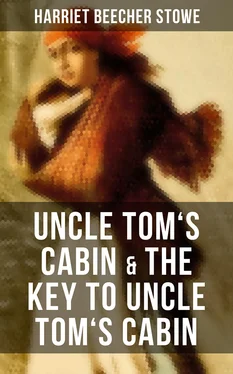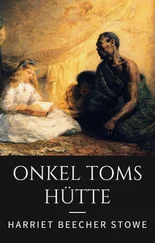"I broke a fellow in, once," said St. Clare, "that all the overseers and masters had tried their hands on in vain."
"You!" said Marie; "well, I'd be glad to know when you ever did anything of the sort."
"Well, he was a powerful, gigantic fellow,—a native-born African; and he appeared to have the rude instinct of freedom in him to an uncommon degree. He was a regular African lion. They called him Scipio. Nobody could do anything with him; and he was sold round from overseer to overseer, till at last Alfred bought him, because he thought he could manage him. Well, one day he knocked down the overseer, and was fairly off into the swamps. I was on a visit to Alf's plantation, for it was after we had dissolved partnership. Alfred was greatly exasperated; but I told him that it was his own fault, and laid him any wager that I could break the man; and finally it was agreed that, if I caught him, I should have him to experiment on. So they mustered out a party of some six or seven, with guns and dogs, for the hunt. People, you know, can get up as much enthusiasm in hunting a man as a deer, if it is only customary; in fact, I got a little excited myself, though I had only put in as a sort of mediator, in case he was caught.
"Well, the dogs bayed and howled, and we rode and scampered, and finally we started him. He ran and bounded like a buck, and kept us well in the rear for some time; but at last he got caught in an impenetrable thicket of cane; then he turned to bay, and I tell you he fought the dogs right gallantly. He dashed them to right and left, and actually killed three of them with only his naked fists, when a shot from a gun brought him down, and he fell, wounded and bleeding, almost at my feet. The poor fellow looked up at me with manhood and despair both in his eye. I kept back the dogs and the party, as they came pressing up, and claimed him as my prisoner. It was all I could do to keep them from shooting him, in the flush of success; but I persisted in my bargain, and Alfred sold him to me. Well, I took him in hand, and in one fortnight I had him tamed down as submissive and tractable as heart could desire."
"What in the world did you do to him?" said Marie.
"Well, it was quite a simple process. I took him to my own room, had a good bed made for him, dressed his wounds, and tended him myself, until he got fairly on his feet again. And, in process of time, I had free papers made out for him, and told him he might go where he liked."
"And did he go?" said Miss Ophelia.
"No. The foolish fellow tore the paper in two, and absolutely refused to leave me. I never had a braver, better fellow,—trusty and true as steel. He embraced Christianity afterwards, and became as gentle as a child. He used to oversee my place on the lake, and did it capitally, too. I lost him the first cholera season. In fact, he laid down his life for me. For I was sick, almost to death; and when, through the panic, everybody else fled, Scipio worked for me like a giant, and actually brought me back into life again. But, poor fellow! he was taken, right after, and there was no saving him. I never felt anybody's loss more."
Eva had come gradually nearer and nearer to her father, as he told the story,—her small lips apart, her eyes wide and earnest with absorbing interest.
As he finished, she suddenly threw her arms around his neck, burst into tears, and sobbed convulsively.
"Eva, dear child! what is the matter?" said St. Clare, as the child's small frame trembled and shook with the violence of her feelings. "This child," he added, "ought not to hear any of this kind of thing,—she's nervous."
"No, papa, I'm not nervous," said Eva, controlling herself, suddenly, with a strength of resolution singular in such a child. "I'm not nervous, but these things sink into my heart."
"What do you mean, Eva?"
"I can't tell you, papa, I think a great many thoughts. Perhaps some day I shall tell you."
"Well, think away, dear,—only don't cry and worry your papa," said St. Clare, "Look here,—see what a beautiful peach I have got for you."
Eva took it and smiled, though there was still a nervous twiching about the corners of her mouth.
"Come, look at the gold-fish," said St. Clare, taking her hand and stepping on to the verandah. A few moments, and merry laughs were heard through the silken curtains, as Eva and St. Clare were pelting each other with roses, and chasing each other among the alleys of the court.
There is danger that our humble friend Tom be neglected amid the adventures of the higher born; but, if our readers will accompany us up to a little loft over the stable, they may, perhaps, learn a little of his affairs. It was a decent room, containing a bed, a chair, and a small, rough stand, where lay Tom's Bible and hymn-book; and where he sits, at present, with his slate before him, intent on something that seems to cost him a great deal of anxious thought.
The fact was, that Tom's home-yearnings had become so strong that he had begged a sheet of writing-paper of Eva, and, mustering up all his small stock of literary attainment acquired by Mas'r George's instructions, he conceived the bold idea of writing a letter; and he was busy now, on his slate, getting out his first draft. Tom was in a good deal of trouble, for the forms of some of the letters he had forgotten entirely; and of what he did remember, he did not know exactly which to use. And while he was working, and breathing very hard, in his earnestness, Eva alighted, like a bird, on the round of his chair behind him, and peeped over his shoulder.
"O, Uncle Tom! what funny things you are making, there!"
"I'm trying to write to my poor old woman, Miss Eva, and my little chil'en," said Tom, drawing the back of his hand over his eyes; "but, some how, I'm feard I shan't make it out."
"I wish I could help you, Tom! I've learnt to write some. Last year I could make all the letters, but I'm afraid I've forgotten."
So Eva put her golden head close to his, and the two commenced a grave and anxious discussion, each one equally earnest, and about equally ignorant; and, with a deal of consulting and advising over every word, the composition began, as they both felt very sanguine, to look quite like writing.
"Yes, Uncle Tom, it really begins to look beautiful," said Eva, gazing delightedly on it. "How pleased your wife'll be, and the poor little children! O, it's a shame you ever had to go away from them! I mean to ask papa to let you go back, some time."
"Missis said that she would send down money for me, as soon as they could get it together," said Tom. "I'm 'spectin, she will. Young Mas'r George, he said he'd come for me; and he gave me this yer dollar as a sign;" and Tom drew from under his clothes the precious dollar.
"O, he'll certainly come, then!" said Eva. "I'm so glad!"
"And I wanted to send a letter, you know, to let 'em know whar I was, and tell poor Chloe that I was well off,—cause she felt so drefful, poor soul!"
"I say Tom!" said St. Clare's voice, coming in the door at this moment.
Tom and Eva both started.
"What's here?" said St. Clare, coming up and looking at the slate.
"O, it's Tom's letter. I'm helping him to write it," said Eva; "isn't it nice?"
"I wouldn't discourage either of you," said St. Clare, "but I rather think, Tom, you'd better get me to write your letter for you. I'll do it, when I come home from my ride."
"It's very important he should write," said Eva, "because his mistress is going to send down money to redeem him, you know, papa; he told me they told him so."
St. Clare thought, in his heart, that this was probably only one of those things which good-natured owners say to their servants, to alleviate their horror of being sold, without any intention of fulfilling the expectation thus excited. But he did not make any audible comment upon it,—only ordered Tom to get the horses out for a ride.
Читать дальше












